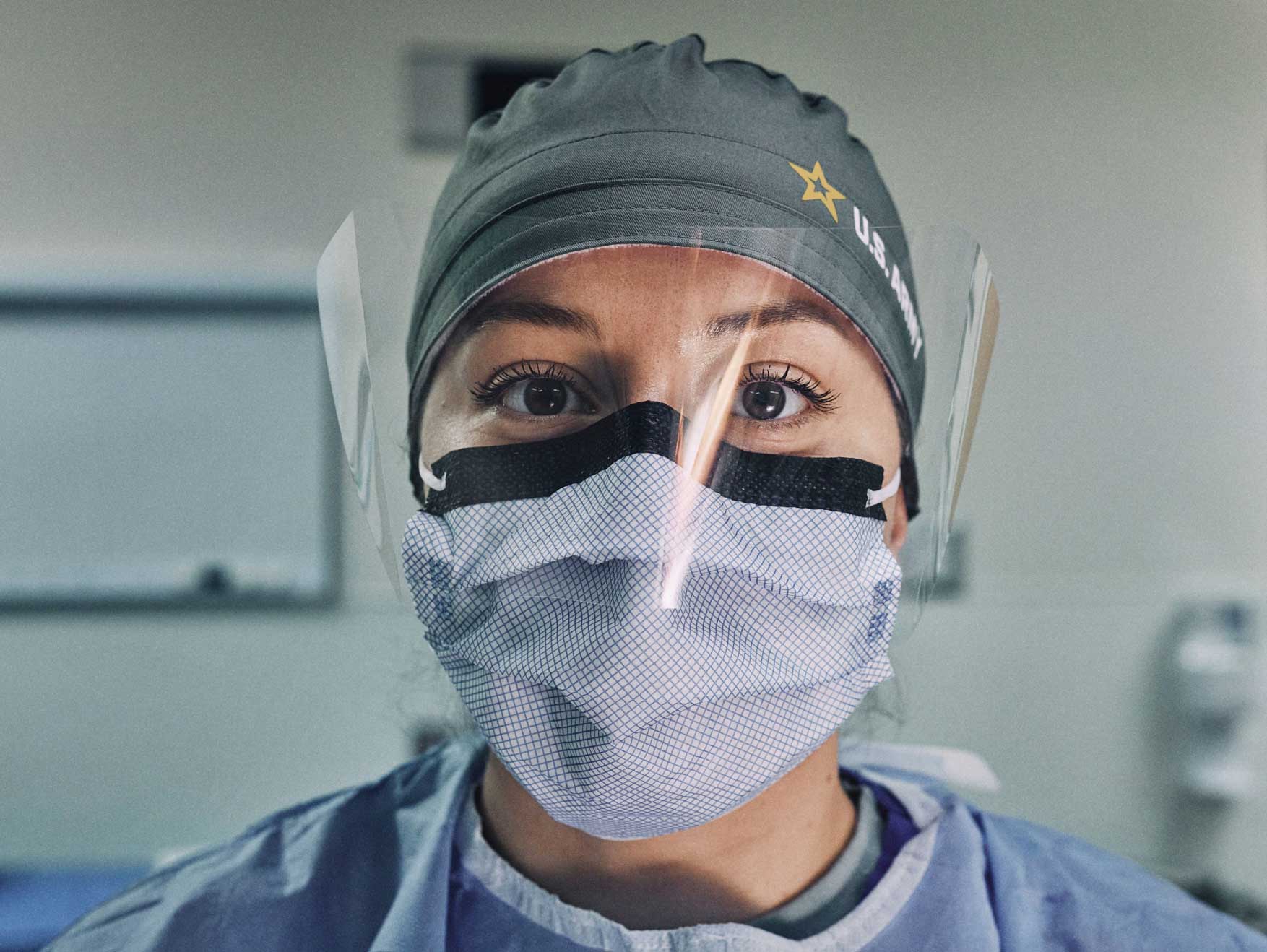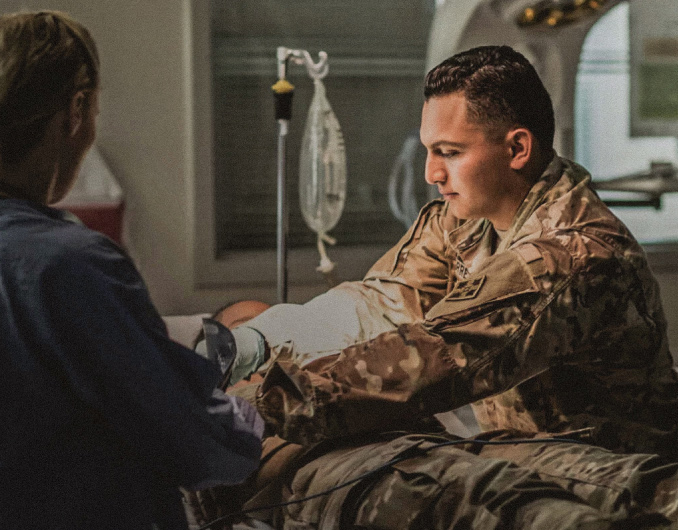Army Medical (AMEDD)
Propel the future of health care.
When you work in the U.S. Army Medical Department (AMEDD), you’re part of the most extensive health care system in the country with opportunities to better lives and change health care as we know it.

Superior training. Specialized care.
As part of the Army health care team, you’ll have access to technologies, facilities, and opportunities unlike anywhere else.
Stay inspired.
With over 40,000 visits to U.S. Army medical facilities and clinics around the world every day, you’ll come across cases and diseases that aren’t typical within the private sector. You’ll also work on vaccines for viruses like Zika and COVID-19 that can have a global impact.
Break barriers.
The Army Medical Department is one of the few places in the world where comprehensive patient care is the top priority. So, you can practice medicine with fewer limitations and treat patients based on their individual needs rather than their ability to pay.
Serve a purpose.
Provide an important service to your country impacting the lives of Soldiers in the Army, as well as their families, friends, and people across the globe.
Train and innovate.
Train in state-of-the-art facilities and work alongside top medical professionals to develop tools and technologies that help diagnose and treat injury or illness, reduce recovery times, and increase quality of life for patients. Some notable innovations include:
- 3D printed surgical implants
- Portable X-ray unit
- Phase III trials for an HIV vaccine and a breast cancer vaccine
We’ll help pay for medical school.

Get full tuition covered for up to 4 YEARS
Get full tuition covered for up to 4 years
If you’re in the Army or haven’t joined yet but want to serve, the U.S. Army’s Health Professions Scholarship Program (HPSP) will help pay for medical school. So, you can:
- Graduate from medical school without debt
- Earn a $2,800+ monthly allowance
- Receive a $20,000 signing bonus if you’re in a medical or dental role
Requirements to join the Army Medical Department (AMEDD)
Whether you’re looking to start your medical career or you’re well into your journey, you’ll need to meet certain requirements.
-
Have or plan to have a medical degree
-
Have or plan to have a license to practice medicine
-
Be between 21 and 42 years old
-
Be eligible for a secret security clearance
The six corps of Army Medical.
Each corps has a specific purpose and works with one another to maintain the U.S. Army’s high standards in patient care.
Army Medical Corps
With over 40 specialties from internal medicine and neurosurgery to pathology and psychiatry, Army Medical Corps physicians practice in three main areas:
- Operational Medicine
- Clinical Medicine
- Research Medicine
Medical Service Corps
The Medical Service Corps is the most diverse branch of the U.S. Army. It consists of medical administrative, scientific, and provider specialties, from direct patient care to management of the U.S. Army’s health service system including:
- Behavioral Sciences
- Health Services
- Laboratory Sciences
- Optometry
- Pharmacy
- Podiatry
- Preventative Medicine
Medical Specialist Corps
The Medical Specialist Corps is home to four distinct specialties:
- Physical Therapists
- Occupational Therapists
- Clinical Dietitians
- Physician Assistants
Army Nurse Corps
The Army Nurse Corps consists of more than 11,000 Soldiers. They’re dedicated to providing unmatched health care to military members, families, and retirees all over the world, while also supporting humanitarian missions, and responding to natural disasters in one of five specialties:
- Critical Care
- Mental Health
- Perioperative
- Emergency Trauma
- Gynecology/Obstetrics
Army Dental Corps
The Army Dental Corps teaches more residents than any other institution in the country with residency graduates scoring in the top 95th percentile. It maintains modern dental facilities in the U.S. and abroad in the following ten specialties:
- General Dentistry
- Comprehensive Dentistry
- Periodontistry
- Endodontistry
- Prosthodontistry
- Pediatric Dentistry
- Public Health Dentistry
- Orthodontistry
- Oral and Maxillofacial Surgery
- Oral and Maxillofacial Pathology
Veterinary Corps
The Army Veterinary Corps oversees all Department of Defense veterinary services. They work to prevent contagious and zoonotic diseases, care for military working dogs and ceremonial horses, treat family pets, and support Human-Animal Bond Programs at military hospitals.
- Veterinary Preventative Medicine
- Laboratory Animal Medicine
- Veterinary Pathology
- Veterinary Comparative Medicine
- Veterinary Clinical Medicine
Army Medical Jobs
Take the first step.
Find out more about becoming a Soldier and if a career in the Army is right for you.
Common questions about Army Medical.
Not finding what you need?
Chat with us any time.
Do Army doctors have to go to Basic Training?
Do Army doctors have to go to Basic Training?
As an AMEDD Officer, you won’t participate in Basic Combat Training that enlisted Soldiers go through. Instead, you’ll attend the AMEDD Basic Officer Leadership Course (BOLC)—a basic orientation course to the Army Health Care System and the Army way of life.
How long is AMEDD BOLC?
How long is AMEDD BOLC?
The AMEDD Basic Officer Leadership Course (BOLC) for active-duty Officers is held four times a year at the AMEDD Center & School in Fort Sam Houston and lasts from 10 to 14 weeks. Officers in the Army Reserve go to BOLC for two weeks. Your training time depends on your chosen specialty and whether or not you have prior military experience.
Do Army physicians have to pass a fitness test?
Do Army physicians have to pass a fitness test?
Yes, you must meet Army height and weight standards, and pass the Army Fitness Test (AFT).
What happens after AMEDD Officer Training?
What happens after AMEDD Officer Training?
After completing BOLC, AMEDD Officers report to their initial active-duty assignment. Medical students return to their academic training following successful completion of BOLC.